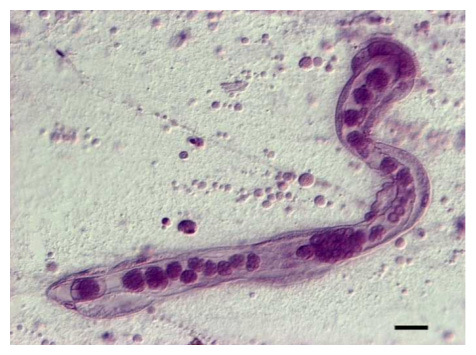Figure
The complex life of a simple parasite
A group of researchers from Okinawa Institute of Science and Technology Graduate University (OIST) and Osaka University sequenced the genome of dicyemids, parasites found in octopuses, presenting important insights into their lifestyle.
Dicyemids, parasites comprised of only ~30 cells, are called mesozoans, an animal group of intermediate complexity between unicellular protozoans and multicellular metazoans. Their simplified bodies consist of three regions, but it was recently found that they had bodies similar to those of general marine invertebrates.
Dicyemids remove their unnecessary genes in order to conserve energy and change reproductive modes (asexual and sexual). Dicyemids inhabiting in the renal sac of octopuses absorb nutrients from the host urine, reproducing asexually and sexually.
Once the population density in the sac reaches a certain threshold, they become sexual. Larvae produced through sexual reproduction leave the host to find new hosts, repeating this cycle, but it is unknown why this simple organism has such a complex lifestyle.
The group of researchers collected urine from live octopuses using a pipette, extracting dicyemids from the urine and carefully removing octopus cells. They extracted the genomic DNA of dicyemids, sequencing the genomes of both organisms: dicyemids and octopuses. By removing already-sequenced octopus genomes from the mixed sequences, they obtained the sequence of dicyemids.
The team found that the dicyemid genome was highly reduced compared to other parasites. A dicyemid has only 4 Homeobox (Hox) genes, important elements that specify the body plans. The Hox gene groups are usually organized, but this isn’t the case for dicyemids. This disorganization seems to be attributed to how dicyemids lose unnecessary genes in order to conserve energy.
In addition, dicyemids also remove genes in their metabolic, immune, and nervous systems. If the genomes of many parasites are sequenced, the unique gene composition of parasites will be revealed from this accumulated genome information. Parasites inhabit every animal on Earth. The entire genome sequence of dicyemids will not only answer big questions in biology, but will also offer insights into the evolution of parasites.

The article “Dicyemid mesozoans: a unique parasitic lifestyle and a reduced genome” was published in Genome Biology and Evolution at DOI: https://doi.org/10.1093/gbe/evz157.
Related links
Department of Biological Sciences, Graduate School of Science, Osaka University









